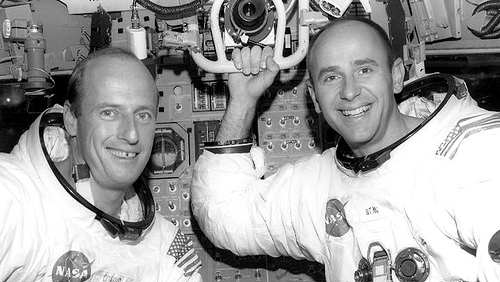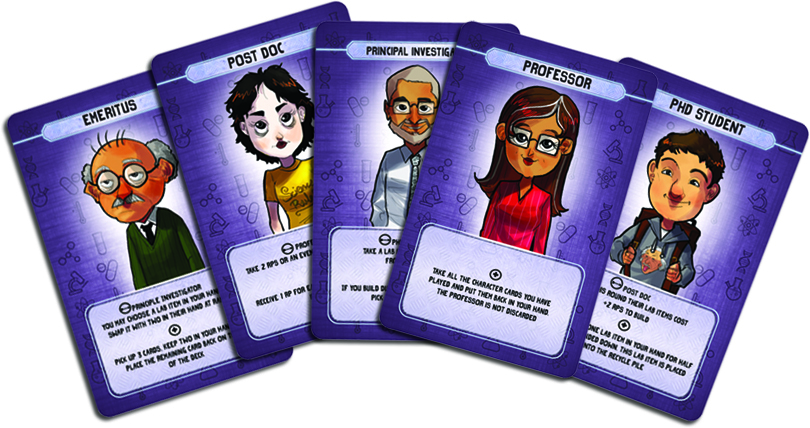
Simulating scientific sabotage, with a board game?
By
Caezar Al-Jassar | February 19th 2016 11:34 AM |
Print |
E-mail


Radioactive isotope in your tea, blatant patent theft and manuscript theft by a peer reviewer? Yep, these are all real actions by scientists who have screwed over other scientists just to get ahead. Why? Because in science "There is no prize for second place". Even in space, do you even remember which crew landed on the moon second? Go on, try not to google it. (For the record it was Charles "Pete" Conrad and Alan Bean). Throw in the pressure of not being given a permanent job and/or being fired for under-performance, despite blood, sweat and tears (pretty much literally for most scientists) and you come close to what a scientist goes through on a day to day basis. It's this pressure that has forced some unscrupulous scientists to sabotage their colleagues in their scientific field. 
Pete Conrad and Alan BeanScientific sabotage is an under reported factBeing a scientist myself I have come across many other scientists who have heard of, personally seen or have been a victim of scientific sabotage. There is even a fantastic book about famous scientists who have cheated and/or sabotaged to get ahead. While the names/places/research will be annonymised I will give a flavour of what I've heard or read. One of the incidents that stuck out in my mind was when I was told of a radioactive isotope poisoning. A researcher was the star of the lab and one of their colleagues did not take kindly to this. Not surprisingly, this dodgy researcher took it upon themselves to do something about it. They researched exactly how much of a radioactive isotope they would need to seriously injure/poison the star researcher but not enough to kill them and set about injecting this quantity into the unfortunate researcher's tea. While I am unaware of whether this was a successful attempt (if you want to call it that), the fact that I heard about this story from a 3rd party from that lab suggests that the perpetrator was found out and presumably sanctions were taken upon them. Another story (which I think is actually quite common) is of two friends and collaborators within a lab stumbling across a fantastic idea to improve a chemical reaction. It turned out that this idea was patentable and profitable based on the number of industrial partners queuing up to use this idea. However, without the other knowing, one of the friends set about patenting the idea and putting it in their name solely. That person, from what I understand, pocketed something in the region of $1 million while the other was left with nothing. While scientists don't go in to science for money (it's a notoriously under paid job) something like having the ability to patent something is an extremely pleasant bonus. Suffice to say I heard that the patent thief had a very unproductive lonely academic life being stigmatised as such, while the loser in this story actually turned out to have an extremely productive and respectable academic life publishing hundreds of papers and becoming head of the department. Communicating this to non-scientists
Communicating this (and other stories) in my mind is extremely important as it shows that scientists have a human side and (a small minority) will cut corners to get ahead. Science is heavily skewed by the scientists themselves as they are the ones driving the research and as we know all too well, humans not computers are the main source of error in most settings. With the knowledge that scientists can make mistakes (or sabotage others) one can hope that the general public would take sensationalist non-science stories from credible news outlets with a pinch of salt. A great example being a glass of red wine being good for you one week, while the next week news outlets telling you they are now bad for you. The moral of the story being how important it is for the general public to educate themselves reading a wide range of sources. This brings me to how I personally intend to communicate the fallacy of scientific research to the masses through a card / board game I developed with my partner.Simulating scientific sabotage, for fun

Being a scientist and avid board gamer I felt that there was nothing out there that captured the essence and beauty of scientific research in a board game. Throw in the fact that board games are seeing a massive resurgence due in part to popular and easy to learn games such as Settlers of Catan and Pandemic (amongst others) we thought "why not make a board game ourselves?" This is particularly pertinent when you realise that crowd funding platform Kickstarter recently released statistics highlighting that in 2015 board games were pledged more money than video games. Despite the fact we started off with 0% board game design knowledge I used my scientific research skills to educate ourselves and started from scratch. The main reason we wanted to create the game is essentially to show what an academic life is like, how we conduct experiments and move up the career ladder. Whenever I give a brief overview to a non academic the career path of an academic they usually stare blankly at me! We also wanted to throw in a more mischievous element to add a "fun factor" which is why we looked at academic sabotage. So from a log cabin in Spain, Lab Wars was born using nothing more than card paper and pen. While there are certainly nuances that the seasoned scientist would pick up, while being fun, it is also subliminally educational. We hope that if we can give back something to scientists and educate the general public just a little bit into the life of an academic we'll feel happy. That is, as long as it gets funded. We're planning on funding it through Kickstarter in June (usually people pledge money for the product to be made - by June Lab Wars will be complete and the money raised will pay for the initial manufacturing run for Kickstarter backers to have the game themselves) and have already been publicised on The Scientist and PopWrapped with 350 newsletter subscribers and 680 twitter followers we feel that we're onto something big and hope that we can capture the imagination of scientists and the general public alike. Nature News and Chemistry World will also be running a review, interview and article on the game each during the campaign. So far we've had a fantastic response to our multiple playtests we've done in London, Cambridge and California. The good news is despite its controversial depiction of academia we've had a huge amount of support thrown our way with the vast majority backing the idea. We have also had a few voices raising concerns regarding the "negative" spin we have put on academics. This is in amongst a raise of anti-vaxxing, homeopathy use and flat world believers. I say to these people if you give someone a chance to learn about how academia works in the first place you can see how difficult it really is to succeed and do good science. We should applaud scientists for their hard work but also make sure we as the general public educate ourselves and not believe everything blindly at first glance.If you want to hear more about our journey to educate the masses while having a load of scientific fun, you can
join our newsletter on our website and pledge for it be to be funded in June.




Comments